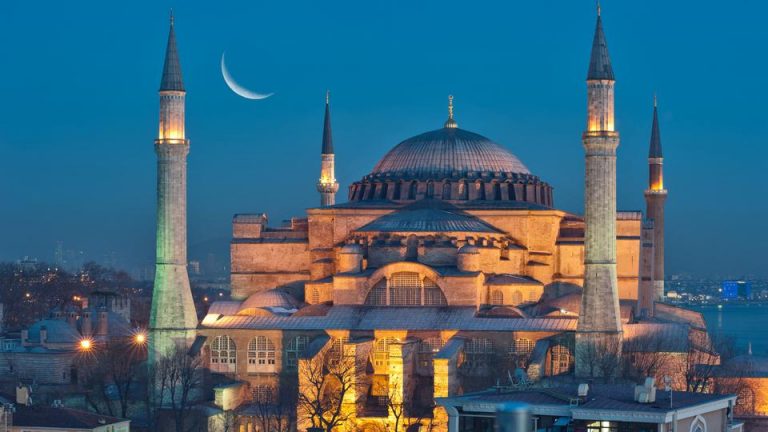
On 11 July, World Council of Churches (WCC) interim general secretary Rev. Prof. Dr Ioan Sauca sent a letter to the Turkish president expressing “grief and dismay,” noting that since 1934, “Hagia Sophia has been a place of openness, encounter and inspiration for people from all nations and religions.”
The letter generated widespread reactions from churches and the media—and also from Muslim leaders.
Sauca met online with H.E. Judge Mohamad Abdel Salam, general secretary of the Higher Committee of Human Fraternity (HCHF), special adviser of the Grand Imam of al Azhar Cheikh Ahmad al Tayeb, and special adviser of the Muslim Council of Elders.
A letter from the HCHF, signed by Abdel Salam, stated: “In recognition of the cultural and spiritual value of Hagia Sophia for humanity all over the world, we support your call to avoid divisions and to promote mutual respect and understanding among all religions, and it gives me pleasure to attach herewith a copy of the Higher Committee of Human Fraternity’s statement regarding this issue.”
The statement reiterated that places of worship must always remain a message of peace and love for all believers. “HCHF calls on everyone to avoid any step that could undermine interfaith dialogue and cross-cultural communication, and that could create tensions and hatred among the followers of different religions, confirming the humanity’s need to prioritize the values of coexistence,” reads the statement. “HCHF considers that the places of worship have a very special meaning for believers, stressing that it must stay the same – as message of peace and love for everyone, and it shouldn’t be used in a way that could contribute to segregation and discrimination, at a time when the world is in real need to respond to religious appealing to achieve human solidarity, and to strengthen the values of coexistence and brotherhood between all humankind.”
Hafid Ouardiri, director of the Muslim Foundation de l’Entre-Connaissance in Geneva, founding member and vice-president of the Interreligious Platform of Geneva, and founding member and vice-president of the Spiritual Appeal of Geneva wrote in a letter to the WCC: “I would like to express my full support for the letter addressed to the President of Turkey, Mr. Recep Tayyep Erdogan, by Rev. Prof. Dr Ioan Sauca, interim general secretary of the World Council of Churches in Geneva, about the conversion of Hagia Sofia into a mosque when it was a museum symbol of respect for beliefs and an example for peace… As a Muslim, like many others around the world, we pray that Hagia Sofia, in Turkey we love with all our heart, remains what she has always been since 1934, namely a crossroads of knowledge, of light, wisdom and peace for all humanity.”
Sauca said he was surprised and grateful by the widespread reactions of solidarity and support: “The outpouring has been more than we could ever have expected,” he said. “Muslims and Christians have lived side-by-side throughout history in the Middle East and, based on their common affirmation of the love of God and of the neighbor, found ways of cohabitation, cooperation and mutual support.”
He also noted that interreligious dialogue has been ongoing for almost 50 years and, in these times, has to be deepened further, and is needed more than ever. “I am proud and encouraged to see the signs of support and solidarity expressed by our Muslim partners and friends,” Sauca said. “It proves that our dialogue is deep and genuine, and together we could achieve the dream of building a peaceful world in which people and religions respect and support one another.”
Sauca shared a summary of the dialogue and response from the WCC’s Muslim partners during his report to the WCC executive committee, which is convening online this week. The executive committee strongly affirmed the WCC interim’s general secretary’s letter of 11 July concerning the re-conversion of Hagia Sophia in Istanbul from a museum back to a mosque, underlining the negative impacts on inter-religious relations, and appealing for this decision to be reversed and for Hagia Sophia to be retained as the shared heritage of humanity.
The WCC executive committee also welcomed the very high level of media attention that this letter received around the world and expressed gratitude for the support of leading Muslim counterparts. The committee also invited prayerful solidarity and support by WCC member churches around the world in their efforts to challenge and reverse this gravely regressive decision, and recommends that the executive committee’s Christian solidarity be formally conveyed to the Ecumenical Patriarchate, along with the actions taken by WCC in relation to this matter.